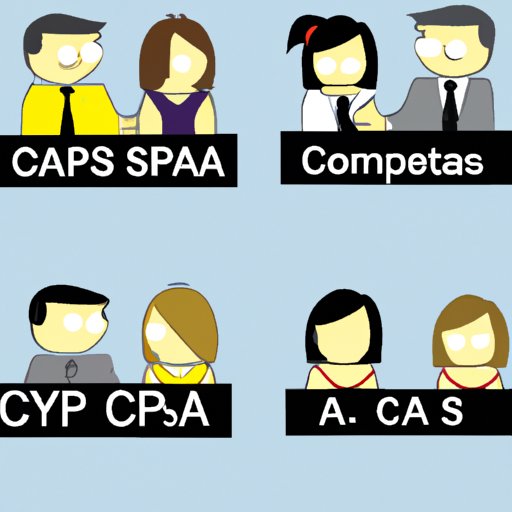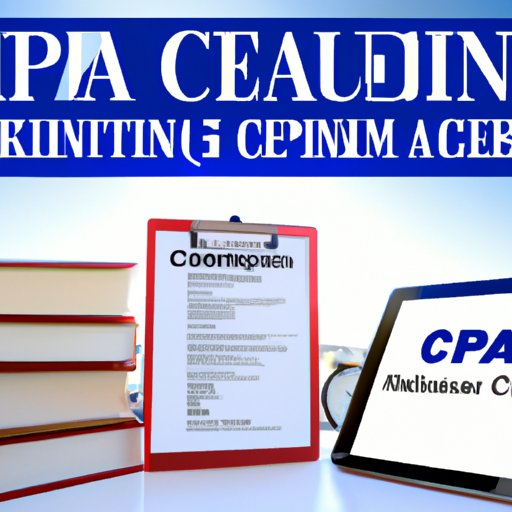Introduction
A Certified Public Accountant (CPA) is a financial expert who serves an important role in the business world. CPAs can work for themselves or for a variety of organizations, including public accounting firms, corporations, and government entities. Becoming a CPA requires meeting certain educational and training requirements, as well as understanding the professional responsibilities associated with this profession.

Overview of the CPA Profession
The American Institute of Certified Public Accountants (AICPA) defines a CPA as “a globally recognized certification that provides assurance to the public that the individual has met the highest standards of competence and integrity in the practice of accountancy.” As a CPA, you may provide services such as tax preparation, financial analysis, auditing, and consulting. In addition, you may advise clients on financial and investment decisions.
Earning a CPA license is not easy — it requires hard work and dedication. However, the benefits of becoming a CPA are numerous. According to the U.S. Bureau of Labor Statistics, employment of accountants and auditors is projected to grow by 10% from 2016 to 2026, faster than the average for all occupations. Additionally, CPAs earn a median annual salary of $70,500, more than double the median salary for all occupations.
Education and Training Requirements for Becoming a CPA
To become a CPA, you must meet certain education and licensing requirements. These requirements vary by state, so be sure to check with your state board of accountancy for specific regulations.
Academic Requirements
In most states, you must complete at least 150 semester hours of college-level courses at an accredited university or college. This typically includes a bachelor’s degree plus additional upper-level accounting courses. You may also need to complete courses in other areas, such as business law and economics. Most states require that you have earned a minimum grade point average in order to sit for the CPA exam.
Licensing Requirements
Once you have completed the required academic coursework, you must pass the Uniform CPA Examination. The exam consists of four sections: Auditing & Attestation, Financial Accounting & Reporting, Regulation, and Business Environment & Concepts. Each section is graded separately, and you must receive a passing score in each section to become a licensed CPA.
Continuing Education
Most states also require CPAs to complete continuing education credits in order to maintain their licenses. This ensures that CPAs stay up-to-date on changes in the accounting industry. Continuing education requirements vary by state, but generally include a combination of self-study and classroom-based courses.

Different Types of Clients CPAs Serve
CPAs serve a variety of clients in different industries. Depending on your interests and professional goals, you may choose to specialize in one type of client or work with a variety of clients. Here are some of the different types of clients CPAs typically serve:
Public Accounting
Public accounting involves providing services to individuals and businesses. This includes preparing taxes, performing audits, offering financial advice, and developing financial strategies. Many CPAs in public accounting work for large accounting firms, while others work independently.
Corporate Accounting
Corporate accounting involves working for a single company or organization. You may be responsible for creating and monitoring budgets, analyzing financial data, and providing financial advice. Corporate CPAs often specialize in one particular area, such as taxation or cost accounting.
Government Accounting
Government accounting involves working for a federal, state, or local government agency. You may be responsible for managing funds, preparing financial reports, and ensuring compliance with government regulations. Government CPAs often specialize in areas such as fraud investigation or budget analysis.
Tips on How to Pass the CPA Exam
Passing the CPA exam is no small feat — it requires knowledge, dedication, and hard work. Here are some tips to help you prepare for the exam:
Understand the Exam Structure
The CPA exam consists of four sections, each of which tests your knowledge and skills in different areas. Before you begin studying, make sure you understand the structure of the exam and what topics will be covered.
Make a Study Plan
Develop a study plan that works for you. Make sure you break up the topics into manageable chunks and give yourself enough time to review them thoroughly. Also, consider taking practice exams to help you identify areas where you need to focus your studies.
Utilize Practice Exams
Practice exams are an invaluable tool when it comes to studying for the CPA exam. They allow you to get a feel for the format of the exam and test your knowledge of the material. Taking practice exams can also help you identify any weak areas you need to focus on.

Professional Responsibilities of a CPA
In addition to meeting the education and licensing requirements, CPAs must also adhere to certain ethical and legal standards. Understanding these standards is essential for maintaining your CPA license.
Ethical Standards
CPAs must adhere to a strict code of professional ethics. According to the AICPA Code of Professional Conduct, CPAs must act with integrity, objectivity, independence, and due care when providing services to their clients. Failure to adhere to these standards can result in disciplinary action.
Legal Obligations
CPAs must understand and comply with applicable laws and regulations in their jurisdiction. This includes federal, state, and local laws, as well as international laws if applicable. CPAs must also understand the implications of any changes in the law and make sure they are compliant.
Professional Competence
Finally, CPAs must maintain their professional competence by staying up-to-date on changes in the accounting industry. This includes participating in continuing education courses and reading professional publications. CPAs must also be aware of any new technologies or tools that may affect their practice.
Conclusion
Becoming a CPA is a long and challenging process, but the rewards are worth the effort. Earning a CPA license provides access to a wide range of career opportunities, and the potential for high earning potential. In addition, CPAs must adhere to a strict code of ethical and legal standards to ensure they provide the best possible service to their clients.
If you’re considering becoming a CPA, make sure you understand the education and experience requirements, the different types of clients CPAs serve, and the professional responsibilities associated with this profession. With the right amount of dedication and hard work, you can become a successful CPA.
(Note: Is this article not meeting your expectations? Do you have knowledge or insights to share? Unlock new opportunities and expand your reach by joining our authors team. Click Registration to join us and share your expertise with our readers.)
